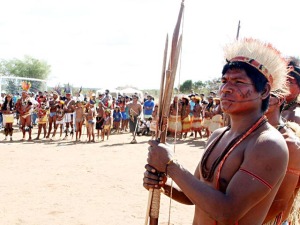How the Peruvian Government is Denying Indigenous Peruvians the Right to Prior Consultation
- Por: Yurica Ramos*
- Carlos Ramos **

There are international legal frameworks that regulate the rights of indigenous peoples to prior consultation. Peru assigns constitutional rank to these frameworks that help to interpret and regulate national laws[1]. Peruvian laws that protect prior consultation right of indigenous people have been adjusted to fulfill Peru’s international obligations. However, there is conflict amongst national Peruvian laws that have subjugated indigenous people, to the point of putting their existence at risk, because they cannot control their lands.
This conflict has allowed concession rights to be granted without a consultation process and has caused many indigenous people to be misidentified. In both situations, international laws were ignored. To overcome these injustices, the government must reform its laws and rectify the damage caused to indigenous people.
Indigenous people have been deprived of their lands, territory and natural resources since the 16th century. Conquistadors and private companies have appropriated and used indigenous and tribal peoples’ property largely without their consent. In order to protect the land of indigenous people the Convention 169 of the International Labour Organization (ILO), The Declaration on the Rights of Indigenous People, and other international treaties where created. Furthermore, the Inter- American Human Rights System has developed norms and jurisprudence that have created a legal framework for prior consultation procedures.
In Peru, there are laws that protect prior consultation rights of indigenous people in regard to their lands. However, there is conflict among the national legal framework constituted by laws, supreme decrees, and ministerial resolutions that violate national and international laws and principles that protect and guarantee the rights of indigenous people. For example, the Peruvian Prior Consultation Law states that indigenous people must be consulted when a legislative or administrative measure that affects them directly is given[2]. On the other hand, the Peruvian General Mining Law, which regulates concession rights, does not demand a prior consultation process before these concession rights are granted by administrative measures[3]. Conflict arises due to the fact that one law obligates the government to consult indigenous people while the other law does not require this. Consequently, Indigenous people are not consulted before concession rights are granted. This situation also defies the Inter-American Court of Human Rights that states that before a state can grant concession right, the prior consultation process must be completed[4].
Another big issue is the method used by the government to identify indigenous people. The ILO Conventions 169 and the Prior Consultation Law state specific criteria to identify indigenous people[5]. The Peruvian government has created a database in which indigenous people are identified[6]. The database is used, by government agencies, to identify indigenous people who must be consulted. However, the Intercultural Vice Ministry, which is in charge of creating and updating the database, has failed to identify indigenous people correctly, which has negatively impacted their right to consultation. For instance, the indigenous Quechua people called “Campesinos” are not formally identified in the database even though they fulfill the specific criteria established by the national and international laws. Therefore, “Campesinos” were not consulted when the Ministry of Energy and Mines approved administrative measures that authorized the development of mining projects such as “Anama” and “Las Bambas”[7]. Moreover, in both projects the principle of opportunity that asserts indigenous people should be consulted before an administrative legal measure was infringed[8].
Both the failure of properly identifying indigenous people and the conflict between national laws has caused tremendous damage to indigenous people. This damage also results from inadequately adhering international laws. The government’s actions have jeopardized the indigenous people’s existence, cultural identity, quality of life and their development. In light of this situation, legislators must review all the laws that hinder the collective rights of indigenous people. This can be accomplished by integrating international laws into national laws properly. Additionally, the Peruvian Constitutional Court and the Supreme Court must demand that government agencies apply national and international laws in order to protect the rights of indigenous people.
[1] Based on the article 3 and 55 of the Peruvian Constitution and the Article V Preliminary Title of the Constitutional Process Code, international treaties are part of national laws.
The Constitutional Court (CC) in the paragraph 9 of the Case No 00022-2009-PI/TC claims that the articles of the convention No 169 have a normative and interpretative function.
[2] Article 1 and 2 of the Prior Consultation Law No 29785
[3] The Peruvian General Mining Law is the key legislation governing mining activities in Peru and it was approved by Supreme Decree No 014-92-EM
[4] Case of the Saramaka People v. Suriname, paragraph 155 – 158
[5] Article 1 of the 169 Convention of the ILO and the Article 7 of The Prior Consultation Law No 29785
[6] Article 20 of the implementing regulation, approved by Supreme Decree No 001-2012-MC, of the Prior Consultation Law
[7] In 2012, the general parliamentary direction of the Peruvian congress stated that these projects were in an advance exploration stage.
[8] Article 4 of the Prior Consultation Law No 29785
*Yurica Ramos is L.L.B in Law (Bachelor in Law) by la Universidad Nacional Mayor de San Marcos and Master in Law in International Legal Studies at American University Washington College of Law, 2015.
**Carlos Ramos is Lawyer by la Universidad Nacional Mayor de San Marcos and Master in Political Science by La Universidad Católica del Perú, 2014.
